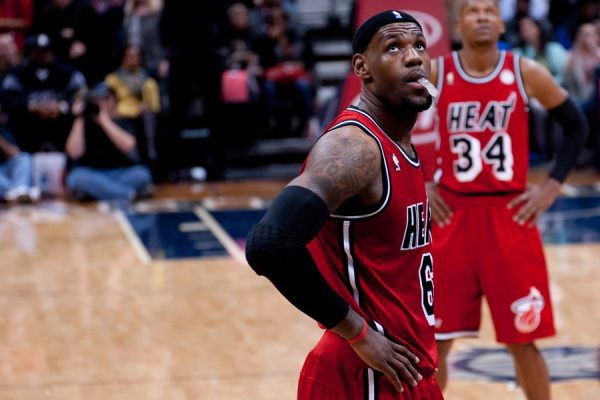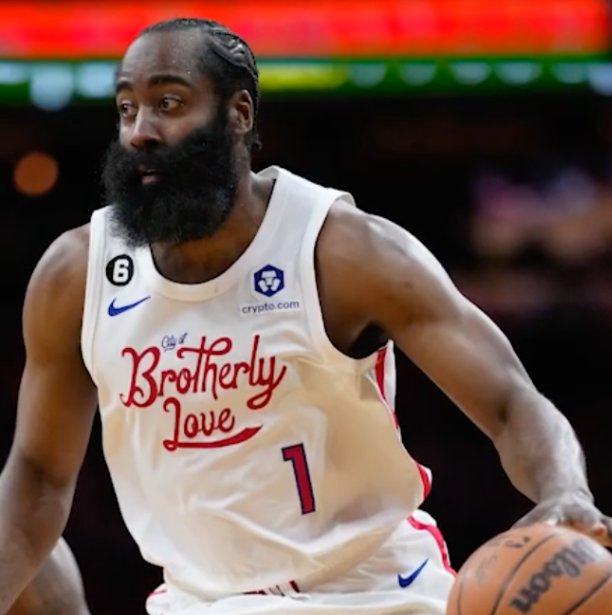James Harden, the 2018 NBA MVP, is one of the greatest players of this generation. He is a 3-time scoring champion, 2-time assists leader, and has made the NBA’s 75th Anniversary Team. Despite the statistics and accolades to back him up, Harden’s attitude is a major problem and is directly impacting his basketball legacy.
As a member of the Philadelphia 76ers in the 2022-2023 season, Harden led the league in assists and even propelled his teammate Joel Embiid to win the MVP award. However, he crumbled in the playoffs with a humiliating Game 7 performance against the Boston Celtics to lose in the Eastern Conference Semis.
Considering his age and reputation as a terrible playoff performer, Harden did not earn a long-term contract and furiously demanded a trade. This was his third trade request in just the last three years, and his wishes were always miraculously granted: he had gone from Houston to Brooklyn to Philadelphia. Now, he wanted to go to the bright lights of Los Angeles.
On the dawn of Halloween, James Harden was dealt to the Los Angeles Clippers to join superstars Kawhi Leonard, Paul George, and Russell Westbrook. I woke up to this news in shock and thought to myself: How does this man get exactly what he wants every time?
In this era of player empowerment, the distinction between real/physical sports and sports video games becomes increasingly blurred. James Harden’s transition to the Clippers is the perfect example of this. Players are now more than athletes on a roster; they control the narrative by picking and choosing their own path like video game characters.
In popular sports video games, the players have the liberty to freely move athletes across teams to create fantasy lineups and fulfill dream scenarios. This kind of virtual freedom was once limited to computers and consoles, but it has now manifested itself in the NBA. Now, the power to create dream lineups lies in the hands of the players themselves. If a player feels unhappy about their current situation, they’ll simply demand a trade, sit out, and wait until they are moved somewhere else.
The power dynamics in sports leagues have traditionally favored the team owners and general managers. Owners and managers would orchestrate trades, draft the players, and ultimately determine the future of the team. Now, they aren’t allowed to do their jobs because the power has shifted to the players themselves. Superstars like Lebron James now have significant say in their placements, sometimes overriding the decisions of their coaches and general managers.
This player-driven dynamic is a form of agency that was rarely seen in past decades. Players can now effectively choose their own adventure by aligning themselves with teammates and franchises that best fit their values and playing styles. This trend adds an additional level of strategy into the NBA because players not only consider their performance on the court but also moves off the court that can help them win. Players now need to be conscious when building friendships and alliances with other players that would influence team decisions.
However, player empowerment can be a double-edged sword. For instance, Lebron James was more than a basketball player in Cleveland: he was a hometown hero, someone who embodied hope and pride for the people. During free agency in 2010, Lebron decided to leave for Miami. This infamous decision mirrored a decision in a video game to seek better opportunities to win. While it ultimately benefited his career as he won 2 championships, it impacted Cleveland on both an emotional and economic level. The fans reacted with a combination of anger, betrayal, and heartbreak. They felt that the hero whom they believed would save them from misery had ruthlessly abandoned them.

There is a deep emotional connection that fans develop with their teams and particularly its star players. The actions of a single player can have profound emotional implications. In video games, changing teams or trading players is a relatively straightforward decision without real-life implications. In the real world, such moves can scar fanbases and the community forever.
Ultimately, the current power-dynamics of the NBA has practically disintegrated the principle of team loyalty. In the past decades, players would spend their entire career with a single team: Kobe Bryant spent 20 seasons with the Lakers and won 5 championships, Dirk Nowitzki spent 21 years with the Mavericks and won 1 championship, etc. This hallmark has become increasingly rare, and this shift shows a broader change in how players approach their careers.
The virtual world allows for more fluidity in team compositions, as players frequently shift and trade characters to different teams. Loyalty takes a backseat to the goal of winning a championship or creating a fantasy lineup. The NBA reflects a similar trend, where players join other teams for a change of scenery or team up with other superstars to increase their chances of winning.
Although this makes the league more unpredictable and exciting, it also disrupts the tradition of teams being built and grown organically. The question is which championship is more satisfying: three superstars teaming up and winning two championships, or drafting your star players and waiting 8 years for that glorious trophy? I would rather have the latter.
In the NBA, players like James Harden exemplify how player empowerment overrules team loyalty. Although it can add excitement and drama to the league, it also affects the connections between those players to the team and their fans. Ultimately, decisions that were once limited to the virtual world are now having real-life consequences.

